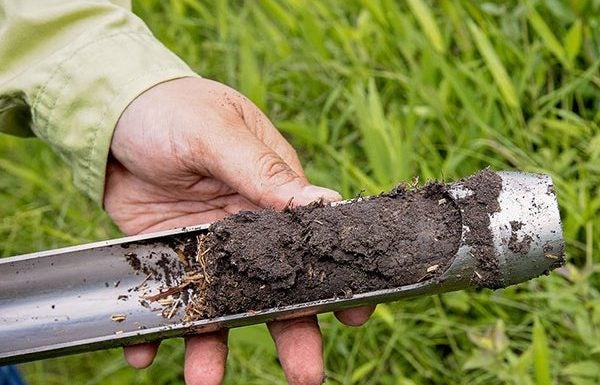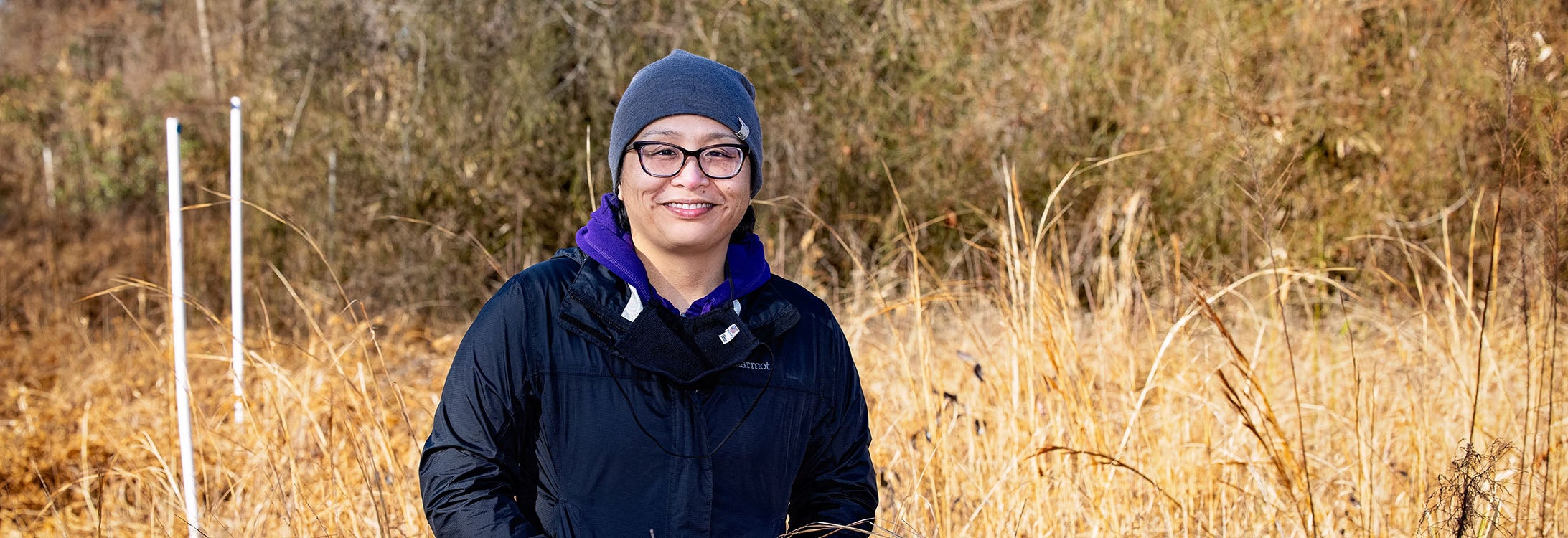MIGHTY MICROBES
Biology associate professor receives 5-Year Achievement for Research & Creative Activity Award
From the smallest particles beneath her feet to the largest ecological processes in eastern North Carolina, Ariane Peralta is studying it all to figure out how environmental changes affect the world around us.
On land or at sea, from soil to water, Peralta investigates the role microorganisms play in the environment, studying the ways they respond to changes around them due to climate change and human activity.
For her research efforts, the Thomas Harriot College of Arts and Sciences associate professor of biology was awarded the Five-Year Research & Creative Activity Award by East Carolina University on Tuesday.
Peralta’s research covers a range of topics — from the types of microbes in our soils to how fertilizers affect the way they interact — as she looks at the drawbacks and benefits of how people alter the world around them.
“I love microbes,” Peralta said, “especially the ones that don’t try to kill you. During undergrad, I learned about how important microbial communities are while I was studying the processes they’re responsible for. That’s when I first learned how interesting these small organisms are and what big jobs they perform in our ecosystems.”
Peralta’s research often takes her to ECU’s West Research Campus. The campus’ wetlands provide a spot for her to take soil samples to determine how fossil fuel particulates, including nitrogen and phosphorus, affect the soil’s microbes and their relationship with plants. Peralta hypothesizes that the excess nutrients increase microbial activity and cause the microbes to release more carbon into the atmosphere — a process that can have tremendous effects on environments that are typically known to store more carbon than they release.
Visit this video on YouTube for closed-captioning.
“The importance of water and wetland ecosystems really stood out to me in graduate school,” Peralta said. “Water is an environmental factor that affects microbes most noticeably.
“I study microbes at the land-water interface because it seemed complicated and challenging. I’m a pretty persistent person and knowing that not everyone was going to get in the mud and study these types of environments which made me think, ‘Hey, I can take advantage of this.’”
Although she’s willing to get dirty, Peralta’s no stick in the mud. She was rewarded for her work in 2019 with a CAREER award from the National Science Foundation. The five-year award — valued at nearly $600,000 — was one of just seven granted to ECU researchers since its inception in 1995.
But her research isn’t limited to the pages of academic journals. She’s made it a mission to put her work to use.
“There are fundamental questions that I ask in my research, but they have real-world applications,” Peralta said. “I was never one that wanted to choose between basic research or applied research.
“Studying how environmental conditions influence microbial biodiversity is important for improving water quality or mitigating climate change effects from greenhouse gas emissions. Engaging with different stakeholders and community populations in our research, while sharing what I’ve learned is something that’s important to me too.”

The soil samples Peralta collects at ECU’s West Research Campus help tell the story of how microbes are affected by nutrients introduced by human processes into wetlands.
Her research has built interesting connections across campus. Peralta has forged relationships with biologists, anthropologists, economists and engineers through different grant projects, serving as a steward for interdisciplinary research on campus.
“We tend to put blinders on in graduate school,” Peralta said. “You want to become an expert in your field; you get so focused. But, when I get the opportunity to take what I’ve learned and start putting it together with other researchers to unravel how these complex systems work, that’s where the real fun begins.”
Peralta has been a big proponent of creating undergraduate research opportunities for ECU students. She leads course-based undergraduate research experiences as part of her teaching load, bringing research into the classroom.
“We all start off as students,” she said. “Providing research access is something that I’m really passionate about. If students get exposed to these topics in the classroom, they may want to learn more and get involved in research.”
With her lab rolling, Peralta is looking at ways to increase ECU’s research offerings. She was appointed director of the interdisciplinary doctoral program in biology, biomedicine and chemistry last year.
“I’m thinking a lot about programming and program funding,” Peralta said. “I’m asking ‘How can we bring the elements we put in practice at the faculty level, such as interdisciplinary research principles, to student training?’ Now it’s about improving our programming and getting the best resources, training and workshops to better prepare our students for their future careers.”
Ariane Peralta’s research grant portfolio includes $4 million in grant funds over the last five years, including more than $2 million as a primary investigator. She’s previously been recognized with ECU’s Scholar Teacher Award and the Coastal Maritime Council Coastal Scholar Award.
